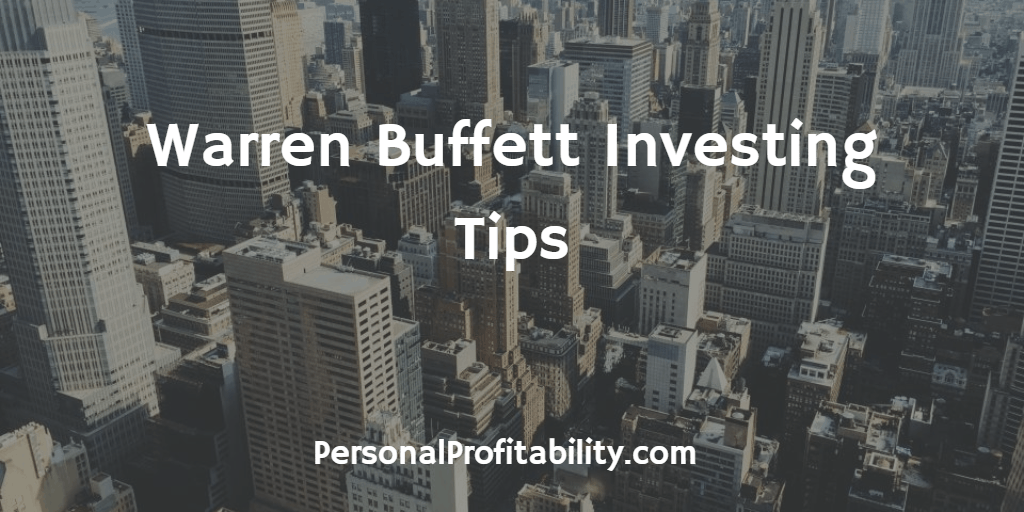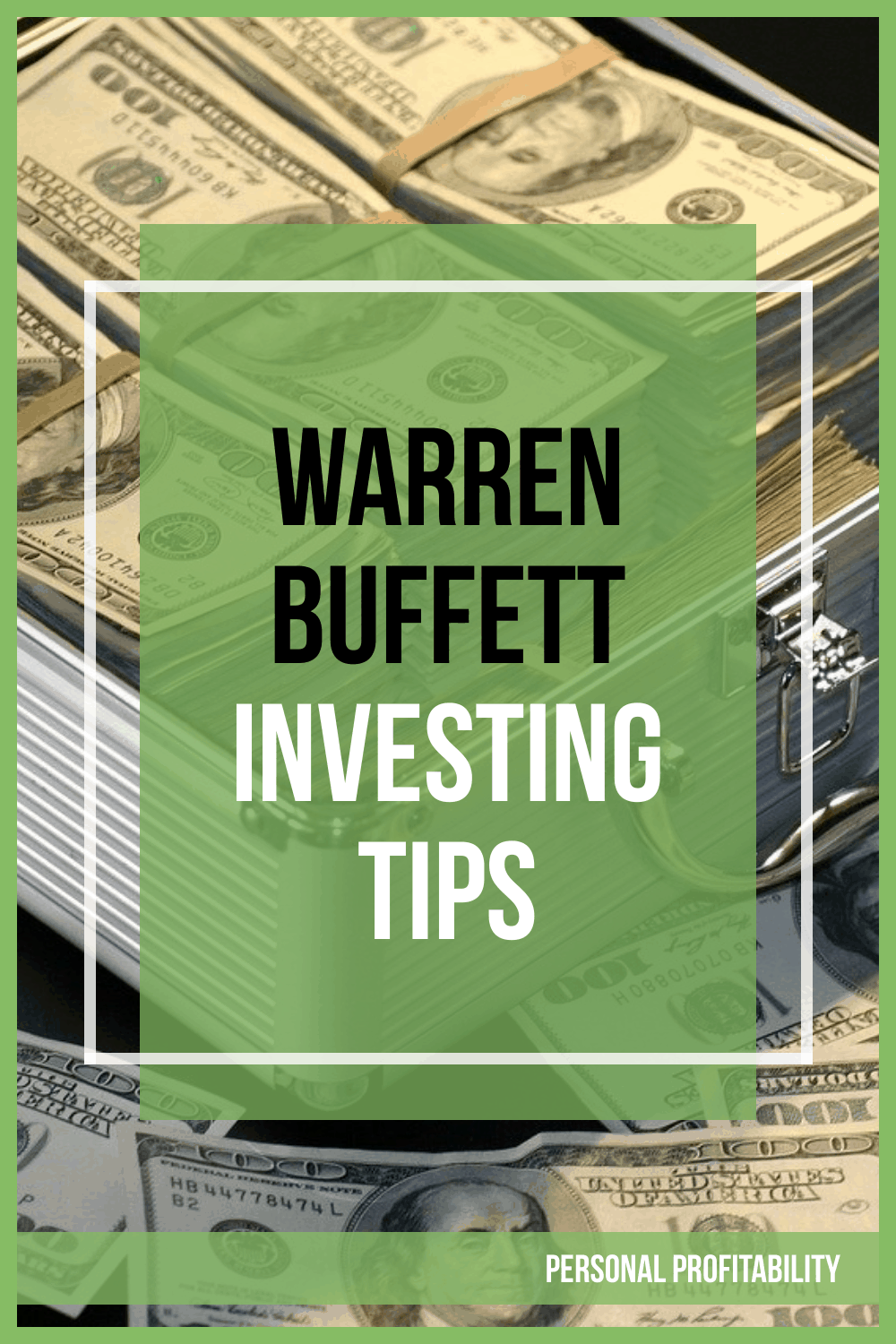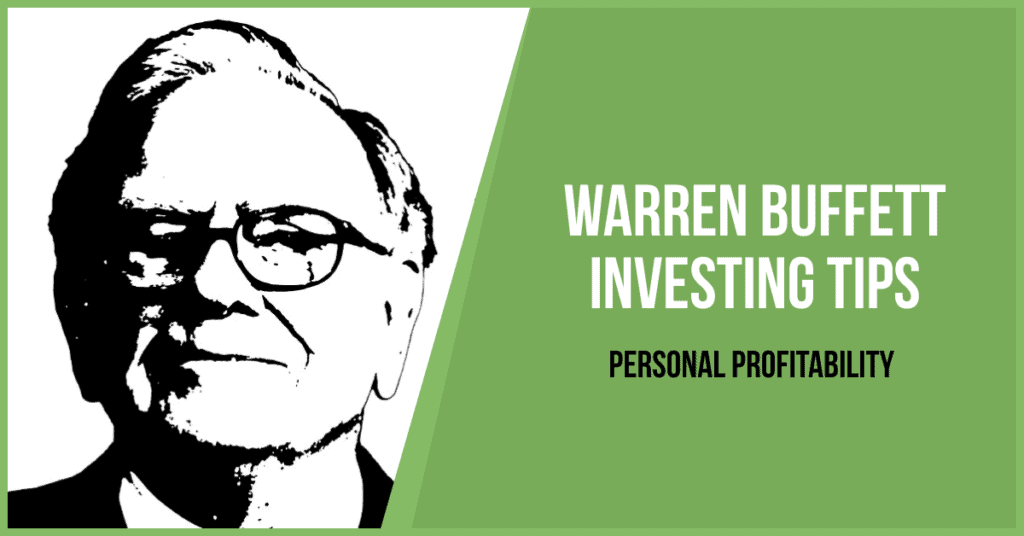Long-time readers know that I am a huge fan of Warren Buffett. I have made the pilgrimage to Omaha three times for the Berkshire Hathaway annual shareholder meeting, and I am always impressed with the practical wisdom shared by “The Oracle from Omaha.” Here are some of my favorite Warren Buffett investing tips you can use when planning your investments.

Rule No.1: Never lose money. Rule No.2: Never forget rule No.1.
Warren Buffett famously said that he has two investing rules. Of course, not every investment Buffett made worked out perfectly, but the end goal is clear. He does not buy into stocks because they are fun, exciting, or sexy. He invests with a specific end goal in mind: making money.
When your hard earned money is on the line, don’t forget about your end goal. You are not in it to look good in front of your friends. You are in it to make money.
Someone is sitting in the shade today because someone planted a tree a long time ago.
Buffett is a man of many analogies. I take this to mean that we need to look far into our future when making financial decisions today. I’m specifically referring to retirement accounts.
Over time, the United States stock market has always gone up. While individual stocks rise and fall, the overall market bounces back from every depression, recession, disaster, and bad news event that causes the market to drop. If you invest today and leave it to grow with long-term results in mind, you will be in better shape than chasing around individual stock tips that you hope will increase in the next few weeks or months.
In the 20th century, the United States endured two world wars and other traumatic and expensive military conflicts; the Depression; a dozen or so recessions and financial panics; oil shocks; a flu epidemic; and the resignation of a disgraced president. Yet the Dow rose from 66 to 11,497.
To continue on the same train of thought, major market indexes are always a safer way to invest than individual stocks. For Buffett, who controls billions of dollars and can buy entire companies, things work a little differently. For us thousandaires and even most millionaires, the best return we can find is investing in a major index.
The Dow Jones Industrial Average and the S&P 500 are two large indexes that follow a basket of stocks rather than a single stock. An investment in a DJIA index fund follows a curated basket of “blue chip” stocks, while the S&P 500 index follows 500 of the largest and most important stocks in the United States.
It’s far better to buy a wonderful company at a fair price than a fair company at a wonderful price.
When you buy a stock, you are buying a piece of the company and trusting that the business will perform well in the future. Executives get their jobs from the Board of Directors, who get their mandate from stockholders. As a shareholder, you put your money and faith into that group of people to do the right thing and generate a return on your investments.
But how do you pick companies that make for good investments? Buffett invests in companies he believes in and businesses he understands. Berkshire Hathaway was shielded from much of the Dot Com bust at the turn of the century because he didn’t understand how they could make so much money and be worth so much. It turned out that was because they could not make money and were not worth much, with a few exceptions.
Wall Street is the only place that people ride to in a Rolls Royce to get advice from those who take the subway.
When you look at Mark Zuckerberg, you would not guess he is a billionaire by the way he dresses. He looks like any other thirty-something, but he is one of the most powerful people in the world with the ability to do anything he wants without approval at the company that controls one of the most popular websites in the world. The same goes on Wall Street.
While Wall Street investment bankers do wear suits a little nicer than Zuckerberg’s trademark hoodie and t-shirt, they commute just like everyone else. And those people, many in their 20s-30s, help the wealthiest people in the world to manage their fortunes.
Buffett lives in the same home today that he purchased in 1958 for $31,000. The home is worth around $652,000 today. Not a bad return on investment, but nothing like what he did in the stock market.
I bought a company in the mid-’90s called Dexter Shoe and paid $400 million for it. And it went to zero. And I gave about $400 million worth of Berkshire stock, which is probably now worth $400 billion. But I’ve made lots of dumb decisions. That’s part of the game.
You win some, you lose some. Even if you are Warren Buffett.
Dexter Shoe was one of Buffett’s bad investments over the years, and those things happen. You can’t let one bad decision ruin a lifetime of investment possibilities. I have invested in a handful of stocks myself, and have only sold one for a loss. If you include the current loser in my portfolio, that brings it to two. If I had let a bad investment turn me off a few years ago, I would not have gained the thousands since.
We all make financial decisions based on the information we have at that moment. Information changes. Some days you do really well, others not so good. That’s okay. That’s why we diversify our investments. Sometimes we just need to take our licks and move forward.
Price is what you pay. Value is what you get.
Every time I think about budgeting, I think about value. We have limited funds, and have to make choices on where to spend our money. I am a huge advocate of values based budgeting, just as Buffett is a champion of value investing.
Everything in the world has a value. While somethings, like services and works of art, have a more subjective value, the value of a share of stock is not quite so subjective. There are tons of calculations analysts use to find the value of a share of stock, and those calculations are designed to find the intrinsic value. Just because the market price of a stock is $50 per share does not mean it is worth $50 per share. It could be worth $20 or $100. Understanding that is key to success in the stock market.
Risk comes from not knowing what you’re doing.
No article on the stock market would be complete without a mention of risk. Every time you invest in the stock market, there is a risk that your investment may be worth less than you paid today. There is a risk it could go to zero, just like Buffett’s infamous investment in Dexter Shoes.
The best way to avoid risk is to not invest at all, but with no risk comes no reward. To minimize risk in my retirement accounts, I follow another Warren Buffet investing tip: I put the bulk of my long-term investments is low fee index funds. My favorite for myself and most of you is the same as Buffett hinted to in a recent annual shareholder letter: the Vanguard S&P 500 index fund.
If you understand what you are doing and invest with the long-term in mind, it is hard to lose. Just put your money in something you believe in and leave it there. Don’t check the prices every day, let alone every hour. Look away and let your money grow. That is the true secret to investing like Buffett.
This post was originally published on July 27,2015 and updated on June 21, 2021.





Great post. Thanks for sharing.